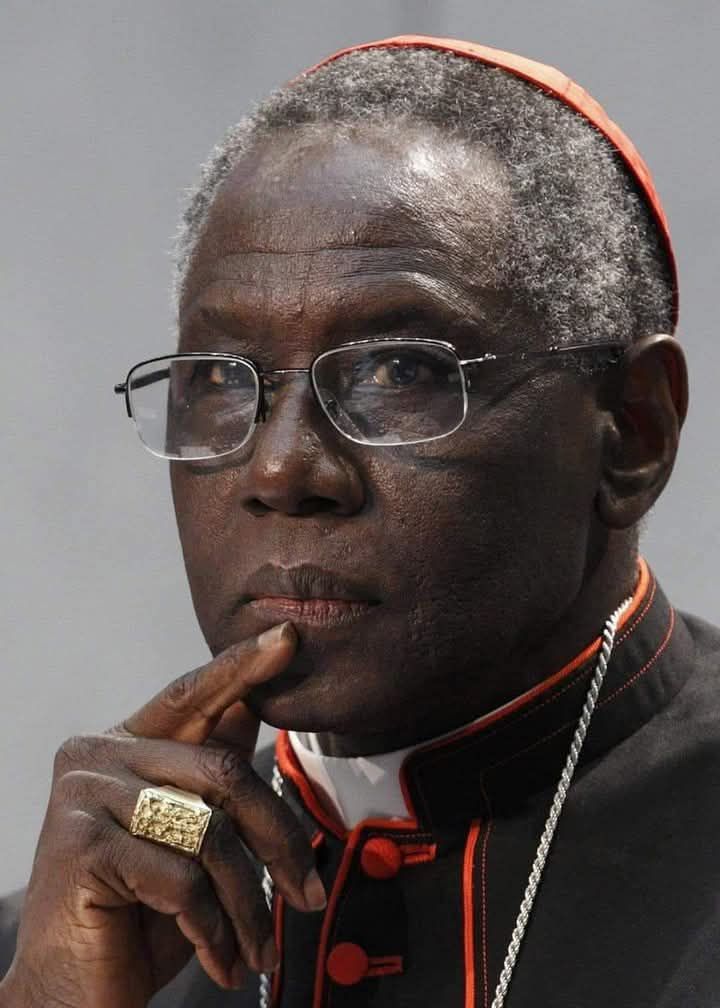✍Ugochimereze Chinedu Asuzu
“History is not a burden on the memory but an illumination of the soul.” ~ Lord Acton
In a move both symbolically charged and ecclesiastically profound, Pope Leo XIV has appointed Cardinal Robert Sarah as a Special Papal Envoy, an office without precedent, a mission without boundaries, and a moment charged with meaning for a Church at the crossroads of tradition and transition.
The announcement came quietly, yet it echoed thunderously through the corridors of Vatican diplomacy and among the faithful who watch the signs of the times. This is not merely an appointment. It is a declaration.
Cardinal Robert Sarah, the Guinean prelate once dubbed “the conscience of Catholic orthodoxy,” had been for years a voice of steady conservatism in a Church swinging between modern adaptation and ancient rootedness. As Prefect of the Congregation for Divine Worship and the Discipline of the Sacraments under Pope Benedict XVI and Pope Francis, his stance on liturgical integrity, moral clarity, and spiritual discipline placed him at times at odds with the prevailing current. That difference cost him influence, and for a time, it seemed his voice had been muffled into ecclesiastical retirement.
But the winds have changed.
With the election of Pope Leo XIV; the first American Pontiff, and a man perceived as a bridge-builder within the polarized terrain of the global Catholic Church, a new chapter has opened. His decision to appoint Cardinal Sarah not only restores a once-sidelined voice, but crafts it into an instrument of global outreach and reconciliation. This is not a rollback to yesterday’s conservatism, nor a surrender to liberal appeasement. It is something subtler and more ambitious: synthesis.
The office of Special Papal Envoy, created under the authority of Pope Leo XIV, is without historical precedent. Unlike the traditional apostolic nuncios or dicastery officials, Cardinal Sarah will not report to the Cardinal Secretary of State. He will report directly to the Pope.
His mission field? The Global South—where the Church is not shrinking, but swelling with vigor; where doctrine is not a debate, but a compass; where the laity kneel in faith, not in apathy.

To send Sarah there is to send a message. The African cardinal represents not just theological orthodoxy but cultural authenticity. He knows the terrain. He speaks the language, not merely linguistically, but spiritually. In a time when many in the Global North are rethinking the Church, the South is rediscovering it. And it is to that rediscovery that Pope Leo is now entrusting a man once deemed too traditional for modern times.
Let us not be naïve. The appointment is also a calculated gesture. Cardinal Sarah’s past critiques of some Vatican initiatives under Pope Francis were not whispered. His warnings about secular encroachments and liturgical laxity were sounded clearly. Yet here he is – chosen by a new Pope, not as an enemy to placate, but as a partner to deploy.
It is a signal of something long prayed for but rarely seen: unity without uniformity. Pope Leo XIV is no ideologue. In entrusting Sarah with such delicate missions, he demonstrates that fidelity to tradition need not be feared, nor progressive instincts despised. It is not the age of winners and losers in the Church; it is the age of workers in the vineyard; each called at different hours, yet paid in full.
This moment, then, is not merely about a man or a mission. It is about a Church in motion, toward wholeness, toward integrity, toward the margins where the Gospel still stirs hearts and reshapes cultures.
And Cardinal Sarah, now no longer a sidelined sage, but a pilgrim of papal intent, embarks on a journey not just across continents, but across the fractures of the soul of the Church itself.
As he sets forth, he does not carry a message of nostalgia, but a flame of continuity.
And as Pope Leo XIV looks toward the vast harvest fields of the Global South, he sends one who knows what it means to pray in silence, preach in boldness, and suffer in loyalty.
Together, they are writing a new page in the old book of Rome, one where orthodoxy and outreach no longer collide, but collaborate.
May the Church of Christ grow not just in numbers, but in unity, in wisdom, and in grace.


